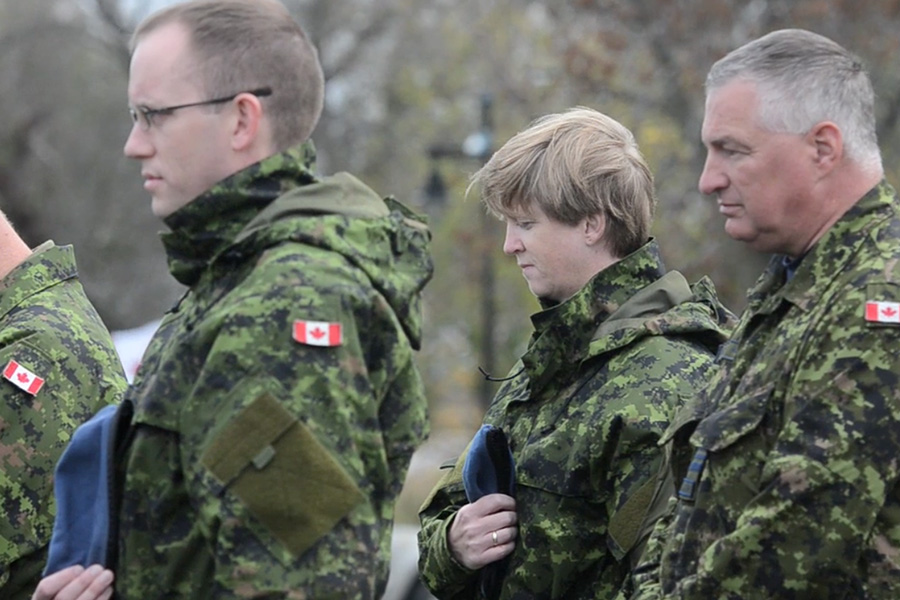Veterans’ rights advocates critique veteran charities

Canadian Forces members acknowledge Durval Terceira at the end of his trek to CFB Trenton to raise funds for veterans Monday. Photo by Shelby Wye
By Shelby Wye
BELLEVILLE – Advocates for Canadian soldiers’ rights are concerned that efforts to raise money to aid veterans may be having an unintended harmful effect.
One recent such effort was a six-day walk by Durval Teirceira of Vaughan, Ont., from Oshawa to Canadian Forces Base Trenton. He raised $30,000 for Renos for Heroes, a non-government organization that helps provide injured Canadian soldiers with homes to suit their disabilities. The not-for-profit organization is run solely on donations from the public, working closely with carpenters’ unions.
“These groups are putting out their best effort, but are they just filling the gap that the government isn’t covering?” said Sean Bruyea, a retired captain in the Canadian military and advocate for veterans’ rights. “I think most Canadians would say: ‘Look, if there’s a medical or financial need of a veteran that is not being met, isn’t that the government’s responsibility to take care of that?’”
Veterans are paid with a lump sum when they leave the service, but have the right to return to Veterans Affairs Canada to ask for more assistance if it’s needed. But according to Ron Cundell, a veteran of the Gulf War, the process of doing so involves a lot of red tape.
“The whole process with (Veterans Affairs), on the applications, is putting a square peg through a round hole. That’s the biggest issue on getting special equipment,” said Cundell.
Also an advocate for veterans’ rights, Cundell deals with Veterans Affairs on a regular basis. He was one of the soldiers who used his right to request more medical assistance, and said he was welcomed mostly with a lot of red tape.
Cundell suffers from sarcoidosis, an autoimmune disease that began in his lungs. He said it was discovered in an examination after he returned from the Gulf War. He was rejected for coverage when he approached Veterans Affairs for assistance. He was told it was unclear whether the disease was caused by his tour in the Gulf War or not, he said. After he appealed to the federal government, he finally got approval for medical assistance for his condition.
“It makes you feel about two inches high (dealing with Veterans Affairs). It makes you feel like a whiner. It puts self-doubt into yourself: like, do I really need this (assistance)?”
Teirceira’s fundraiser managed to cover two returning soldiers’ needs through Renos for Heroes. One of the soldiers, who is wheelchair bound, had reached out to Veterans Affairs for assistance. He was only partially covered by the government, and so Renos for Heroes stepped in to help with the rest.
“We’re probably the last resort (for veterans),” said Deryl Caruk, the director of Renos for Heroes. He walked with Teirceira on his 120-kilometre journey.
“These types of efforts mean absolute wonderfulness to the troops, to show that somebody really cares for them and works for them and that the work they do really matters,” said Caruk. “When you join the forces, you write a blank cheque, and that blank cheque is your life.”
Both Bruyea and Cundell note the importance of such organizations and how they can help veterans. However, they still have concerns that such fundraising efforts allow the government to avoid stepping up to the plate.
“I’ve spoken to Veterans Affairs about this: that you’re letting a charity do your job. They say it’s good to see the Canadian people backing the vets. Yeah, but they are absolving you of your responsibility,” Cundell said.
Caruk said that Renos for Heroes works with the government to find veterans who need help, but it is the organization itself that decides what to do with the money.
Cundell said he would advise the two soldiers receiving help from Renos for Heroes to be careful of the regulations involved with receiving charity assistance. Veterans Affairs can be absolved of responsibility to maintain the renovations because it was done through a charity, he said. This could lead to more problems down the road.
“I’m not trying to take away from the Canadian public: it’s fantastic they’re supporting the troops, but sometimes this support splashes back on the troops and hurts them. And why do I know all this? Why do I know how this system works? Because now, it’s either live, or die.”
Teirceira said he wants to continue to help Renos for Heroes and help Canadian soldiers. He said he plans on making this walk an annual event, hoping to start something big enough to raise even more money.
 Print This Post
Print This Post






